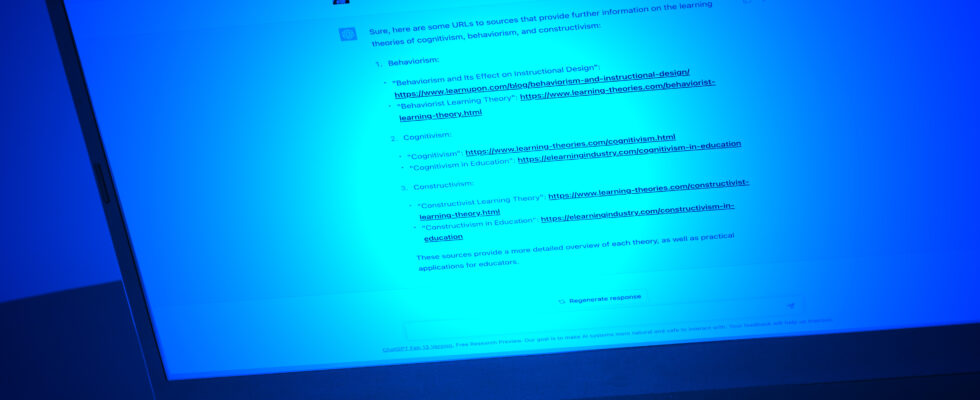One of the main complaints against ChatGPT is to provide information whose veracity and accuracy are uncertain. This is because ChatGPT does not provide sources, footnotes, or links to sources of information used to produce its answers.
But that’s not entirely true.
How to Get ChatGPT to Provide Sources and Citations
If you know how to correctly ask ChatGPT to provide you with sources, it will. Here’s how.
1. Write a query and ask ChatGPT
To get started, you need to ask ChatGPT for something that requires sources or citations. I’ve found that it’s better to ask a question that requires a potentially longer answer so that ChatGPT has more to grind.
Keep in mind that ChatGPT can no longer provide information after 2021 and prior requests for information to the Internet (eg for work on the presidency of Georges Pompidou) will have far fewer sources available.
Here is an example of an exercise I wrote on a subject I worked on a lot when I was in postgraduate:
Décrire les théories d'apprentissage du cognitivisme, du behaviorisme et du constructivisme.2. Ask ChatGPT to provide sources
This is where the prompt technique comes in. This query is a good starting point:
Veuillez fournir les sources de la réponse précédenteI have found that this question often provides offline sources, books, articles, etc. The problem with offline sources is that you cannot verify their veracity immediately. But it is a starting point. A better question is:
Veuillez fournir des sources URLThis specifically tells ChatGPT that you want clickable links to the sources used. You can also improve this query by asking for a specific amount of sources, although the number of responses you’ll get may vary:
Veuillez fournir 10 sources URLIn the next step we will see what we can do with these sources.
3. Attempt to verify/validate the sources provided
Keep in mind this golden rule regarding the sources provided by ChatGPT: ChatGPT is more often wrong than right.
Of the many times I asked ChatGPT for source URLs, about half of them were just plain bad links! Also, 25% or more are links to topics that have little or nothing to do with the one you’re trying to find.
But don’t despair. The idea is not to expect ChatGPT to provide immediately usable sources. If you think of ChatGPT more as a research assistant, it will give you excellent starting points. Use the article names (which may be completely bogus or simply inaccessible) and type them into Google. This will result in interesting search queries, which will more than likely lead to interesting reading and material that can legitimately be used in your research.
Also remember that you are not limited to using ChatGPT. Just because ChatGPT exists doesn’t mean you should forget about all the tools available to researchers and students. Do your own research on the web. Consult primary sources and subject matter experts if available. If you are still studying, you can even ask your librarian for help.
Remember that there are many excellent traditional sources. For example, Google Scholar and JSTOR provide access to a wide range of academic resources that you can cite with confidence.
One last point: if you just copy-paste ChatGPT sources into your search, you might get caught. Use ChatGPT as a hint and not as a way to avoid real research work.
How to make ChatGPT provide more reliable sources?
I’ve found that sometimes – sometimes – if you ask ChatGPT to give you more sources, or if you ask for sources again, it will give you new listings. If you tell ChatGPT that the sources it gave you were wrong, it will sometimes give you better ones. He can also just apologize… Another approach is to restate your original question with a different focus, then ask for sources for the new answer.
Again, my best advice is not to think of ChatGPT as a tool that writes for you, but rather as a writing assistant. Asking for sources to be able to copy-paste an answer from ChatGPT is plagiarism! On the other hand, using ChatGPT’s answer and all the sources you can get from it as clues to further your research and writing is a completely legitimate way to use this fascinating new tool.
Why are ChatGPT sources often so wrong?
In some cases, these are simply dead links. As all sources are at least three years old, some links may have changed. Other sources are of indeterminate age. Since we don’t have a complete list of all ChatGPT sources, it’s impossible to say how valid they were initially. But since ChatGPT was formed mostly without human supervision, we know that most of its sources are unverified and therefore may be wrong, made up, or non-existent altogether.
In short, trust, but verify.
Source: “ZDNet.com”
